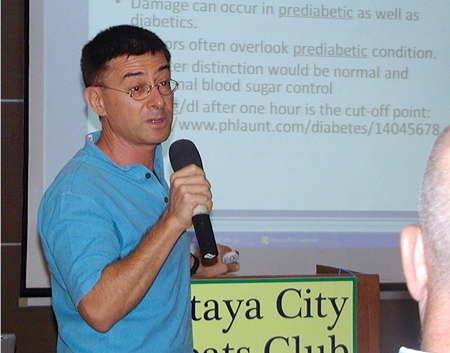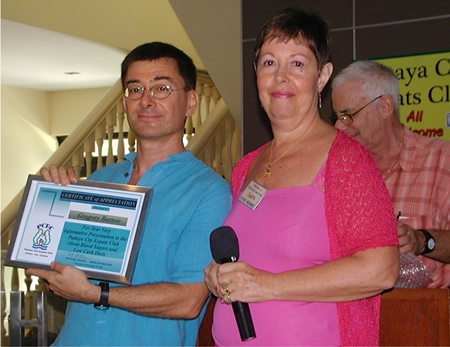Is fat in your diet good for you? If you are pre-diabetic (or even diabetic), Gregory Barton says you may want to consider adding more fat to your diet in place of carbohydrates. Gregory, known to many expats here as the owner of Lulu and Daisy Goat Farm (www.asiagoat.com), spoke at the December 9 Pattaya City Expats Club meeting about the best way to control blood sugar levels.
He became interested in nutrition and medical controversies two years ago when his blood lipids went sky high (cholesterol and triglycerides). He resisted the option of going on a statin and spent more than a year researching alternative methods to bring the numbers down to normal levels. During the course of his research he came across the writing and website of Jenny Ruhl, a blood sugar guru, who has written two books – “Blood Sugar 101,” and “The Truth About Low Carb Diets.” Both of those books summarize the information on her website at www.phlaunt.com/diabetes.
 Greg Barton, owner of Lulu & Daisy Goat Farm has studied & researched the relationship between carbs, sugars and fats in the human body since finding his blood lipids had become sky high.
Greg Barton, owner of Lulu & Daisy Goat Farm has studied & researched the relationship between carbs, sugars and fats in the human body since finding his blood lipids had become sky high.
He explained that the technical term for blood sugar is “glucose,” and that in a normal person glucose levels peak at 110 to 120 mg/dl (milligrams per deciliter) at meal time, and go down to normal level (70 or 80 mg/dl) one hour after eating. People may have high glucose levels if there is too much sugar in the blood or the pancreas is not releasing enough insulin to combat the sugar, or a combination of both.
 Member Michael asks Greg about triglycerides and carbs in one of the many questions from the interested audience.
Member Michael asks Greg about triglycerides and carbs in one of the many questions from the interested audience.
If glucose levels are too high, damage can occur to the body. Persistent high levels of glucose can lead to severe complications such as circulatory problems, kidney disease and blindness. How high is too high? Gregory said that opinions vary, but that he considers a glucose level reading of more than 140 mg/dl one hour after a meal to be in the danger zone. Expanding on that, Gregory said that, ideally, the level should be 140 mg/dl or less one hour after a meal; 120 or less two hours after a meal; and 100 or less three hours after a meal.
Gregory explained that people are considered diabetic if their fasting glucose level is greater than 126 mg/dl, but that the difference between pre-diabetes and diabetes is really a matter of degree, not of kind. Further, he said that people with high levels of glucose do not show any symptoms (unless the level is extremely high); so it is important that people test to find out what their glucose levels are. Gregory noted that he uses a meter to test his blood sugar levels. These meters are readily available at pharmacies and are relatively accurate as long as one sticks to well known brands.
Gregory remarked that the HbA1c test is also useful. This test measures the average level of sugar in the blood over a three-month period. One can have this test done in a hospital or in a clinical laboratory. Gregory said that, in his opinion, a reading of more than 5.5% in an HbA1c test is problematic (the HbA1c test uses a different scale; a reading of 5.5% in the HbA1c test is equivalent to about 111 mg/dl on the fasting glucose scale).
What should one do if levels are too high? The obvious answer, Gregory believes, is to cut down on carbohydrates. Examples of foods with high carbohydrate levels include sugar, sweetened beverages, potatoes, bread and rice.
What should one eat to replace carbs in one’s diet? Gregory said that proteins can replace carbs to some degree, but that the body converts some of the protein into glucose. The best replacements for carbs in the diet, he feels, are fats. He said that he eats loads of fats every day – foods like coconut milk, butter and cream. He also recommended fruits and vegetables that are low in carbohydrates (for example, lettuce, asparagus, and strawberries).
 Board Member Judith presents Greg with a Certificate of Appreciation for his very informative presentation.
Board Member Judith presents Greg with a Certificate of Appreciation for his very informative presentation.
Gregory said that there is a lot of useful information on the carbohydrate content of food at www.nutritiondata.com. He also pointed out that different foods affect people differently, so they should experiment with a variety of foods and test their blood sugar each time to learn what is best for them in their diet. “Eat to your meter,” he called it.
After Gregory answered several questions from the audience, Master of Ceremonies Richard Silverberg provided an update on upcoming events and called on Roy Albiston to conduct the Open Forum where questions are asked and answered about Expat living in Thailand; Pattaya in particular.
Read more about the Club’s activities on their website at www.pattayacityexpatsclub.com.




